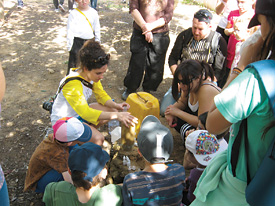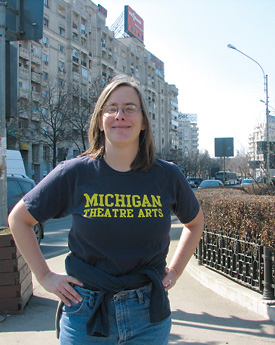There were mounds of snow in Bucharest, no place to park and stray dogs everywhere.
But Fulbright Scholar E.J. Westlake, associate professor of theatre studies in the School of Music, Theatre & Dance, navigated the strange terrain to bring insight about America to her Romanian students. She also gained knowledge to benefit U-M students.


In conjunction with Molly Yunker’s Fulbright Scholar project, an earth science teacher demonstrates groundwater principles to children and their parents using a simulation. Photo courtesy Molly Yunker. Below, E.J. Westlake says that during her Fulbright Scholar experience in Bucharest, Romanian students seeking knowledge of the United States learned of American theater and popular culture. Photo by Claudia R. Wier.
While more Fulbright grants were awarded to U-M students for the 2012-13 academic year than at any other U.S. institution — for the sixth time in eight years — U-M faculty also are taking advantage of Fulbright grant opportunities to spread the Michigan difference globally.
The Fulbright Scholar Program geared to faculty sends 800 U.S. faculty and professionals abroad annually. These grants provide funding for recipients to lecture or conduct research abroad for periods of two to 12 months in 140 countries. In five of the past 13 years, the university has been identified as a Top Producer in the program, based on grants awarded. Since 1999, 79 Fulbright grants have been awarded to faculty at the three U-M campuses.
“In addition to the personal, career and scholarly benefits U-M scholars gain from their Fulbright experience abroad, over the years the university and its students have benefitted from having this large group of faculty in all disciplines who return to share with students and others their experiences living and working abroad,” says Ken Kollman, International Institute director.
International Institute staff members help applicants by providing comprehensive information, instructions and editorial assistance tailored to each application.
After earning her doctorate from the School of Education, Molly Yunker performed her 2010-11 Fulbright Scholar project in Israel. The goal was to promote outdoor settings for teaching, integrated with classroom and laboratory instruction. “I greatly benefited from the Fulbright scholar program, mainly due to the expansion of my network of colleagues, not only in my field, science education, but in other fields,” she says.
With help from that network, Yunker co-organized the first International Conference of the Outdoor Learning Environment, set for February in Israel.
Westlake says that thanks to her 2011-12 Fulbright Scholar experience, Romanians hungry for knowledge of the United States learned about American theater and popular culture. “They were curious about race and gender issues and how those play out in our political system,” she says. In turn, Westlake said her Romanian studies will augment material in her Theatre History I class.
Among new Fulbright Scholars preparing for pending projects are A. Oveta Fuller and June Howard. Fuller, a microbiologist and former pastor who also focuses on HIV and AIDS awareness, will use her dual training to conduct an intervention validity study in Zambia in southern Africa. The associate professor of microbiology and immunology and member of the Center for African Studies will assess how biomedical science education transforms ability of local religious leader networks to address HIV/AIDS.
The science centered approach is designed to reframe HIV as a controllable infectious disease. To help remove stigma and reduce infection and deaths. she says. “Participants engage more readily with resources that already were available but not used. These include training programs for home-care teams to care for people with AIDS, counseling and testing services, feeding programs from the government and initiating new entrepreneurial efforts to increase economic sufficiency.”
Howard, an Arthur F. Thurnau Professor, professor of English language and literature, professor in the American Culture Program, and professor of Women’s Studies, LSA, will teach in the American Studies Program at the University of Southern Denmark in Odense. “I think I’ll learn a lot from their perspective,” she says.
The Fulbright Program is sponsored by the U.S. Department of State Bureau of Educational and Cultural Affairs. For more information, go to www.cies.org.

